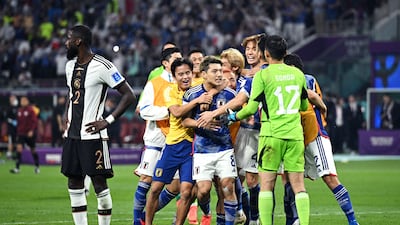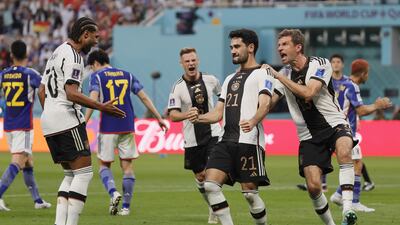Japan claimed the biggest upset in the World Cup since a day earlier after coming from behind to beat Germany in Doha.
The parallels to what had gone before were uncanny. An Asian side overturning a first-half deficit to beat a World Cup powerhouse 2-1.
Where Argentina had led against Saudi Arabia from a Lionel Messi penalty on Tuesday, so too did Germany lead via the spot. It was via playmaker of great renown, too, in the form of Manchester City schemer Ilkay Gundogan.
And the ensuing turnaround was Saud-esque, brought about by a team who would not believe they were beaten. And one who had the skill to bring out the unexpected, and inspire a region – or even a whole continent – in the process.
Germany, with Gundogan and the sublimely-talented teenager Jamal Musiala as their beating heart, controlled the vast majority of the first 75 minutes.
That said, the equaliser, with 15 minutes to go, had been coming. Manuel Neuer, who had been underemployed in the Germany goal till that point – other than one thrilling save a moment earlier – could only pat a cross-shot into the path of Ritsu Doan.
Where many before him had lost their poise when faced with a similar task, the substitute calmly passed the ball into the net to level the scoring.
The roar from the supporters in Samurai blue suggested all their hopes had been answered. But their players were not done yet.
The winner, which followed eight minutes later, was a thing of beauty, brought about by the most exquisite first touch by another substitute, Takuma Asano.
As the ball was launched forward into the inside right channel, Asano, carried the ball forward with a brilliantly deft ttouch that took him through on goal. From a narrowing angle, he lashed his shot into the roof of Neuer’s net to sparked unbridled joy among his team and their support.
It should have been little surprise if Japan had the nous to nullify their more illustrious opposition. After all, eight of their squad – including five of their starting line up - ply their trade in the Bundesliga.
The Asian side started the brighter, too. They had the ball in Neuer’s net just eight minutes in after a rapid break, but Daizen Maeda’s goal was ruled out as he had made his move before Junya Ito had laid on the cross, and been beyond the last defender.
It felt like the wake-up call the Germans required, and they gradually cranked up the pressure. Antonio Rudiger headed wide when well placed from a corner.
Joshua Kimmich saw a shot from range pawed away by Shuichi Gonda, and Gundogan twice saw shots blocked before he was eventually given the chance to open the scoring from the penalty spot.
The chance was presented to him after David Raum, the left-back who enjoyed plenty of freedom down Japan’s right flank in the first half, was tumbled over – at the second attempt – by goalkeeper Gonda.
The direction of traffic was much the same after the internal. Serge Gnabry blazed a shot wide, and Musiala would have been celebrating one of the World Cup’s great goals had he not ballooned his finish over, following a wondrous solo dribble.
Gundogan also hit the post as the Germans pressed at the start of the second phase, again, after a fine run from Musiala.
That felt seminal. It was at that point in which the Japanese players started to rally. Neuer was pressed into action when he expertly beat away a shot from Ito.
When full-back Hiroki Sakai rashly lashed the follow up high and wide, it felt as though Japan's chance had gone. As it turned out, they were only just getting started.









